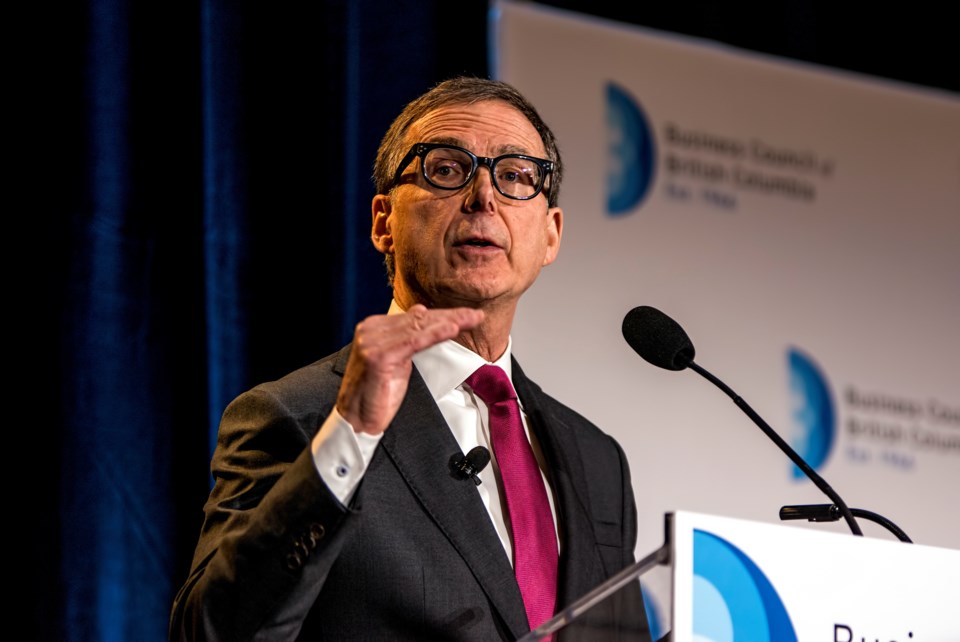B.C. Premier David Eby says he’s undeterred to share further concerns he’s hearing from British Columbians about interest rate hikes to Bank of Canada governor Tiff Macklem, who cautioned the politician on threatening the perceived independence of the central bank.
“I think the independence of the Bank of Canada is just fine; I think he’ll be OK,” said Eby of the Sep. 13 letter he and other premiers received from Macklem after they called for a pause on any further interest rate hikes.
Eby wrote a letter Aug. 30 to tell Macklem that developers were cancelling rental housing projects and mortgage holders were feeling the pinch of hikes. He called the prospect of a further rate hike “disturbing,” suggesting to the governor that he pause hikes.
Such comments were panned by several economists, including B.C.’s former senior aide to the B.C. Minister of Finance and Deputy Premier of B.C. from 2017 to 2019, Rob Gillezeau.
Macklem first thanked Eby for his input on rate hikes; however, he took issue with Eby suggesting the bank ought to take a certain direction, as it assesses the high-inflation environment.
“While I am pleased to get your perspectives on the impact of our policy decisions, instructions or requests from elected officials about how we should set interest rates could create the impression that the Bank of Canada’s operational independence is at risk,” wrote Macklem, who is appointed by the federal government and is provided a mandate to achieve independently.
The Library of Parliament has a background paper on “balancing the financial independence and accountability” of the Bank of Canada.
“On the one hand, central banks need independence, since the best policy for the economy may not align with political goals. On the other hand, in fulfilling their mandate, central banks must be accountable to citizens through their lawmakers,” the paper notes.
As such, Eby’s comments have added to the “ongoing independence‑accountability debate” — albeit one that has seen little chatter over the past 30 years as the consumer price index has remained stable at around two per cent, since such a target was introduced in 1995.
At a press conference in Victoria Tuesday, Eby said the “run-up in interest rates is really unprecedented in recent memory and having a huge impact in British Columbia.”
Eby said it was his job to inform the bank about rate hike impacts; however, he avoided acknowledging that he had provided direction to the bank.
The concern from many economists is that if politicians make such statements it could provide signals to the markets that the bank will follow suit when it should not.
Eby said he had confidence that Macklem could be independent while taking input from politicians such as himself.
As for the impacts, Eby reiterated that the rate hikes, from 0.5 per cent in February 2022 to five per cent now, are having a “huge impact” on financing rental housing developments and cancellations will lead to more pressure on existing supply and greater rent prices.
Eby said inflation figures (presently 3.8 per cent) are mostly augmented now by rising mortgage costs, an assertion Macklem explained in his letter.
“While it’s true that if we hadn’t raised interest rates, the interest rates on mortgages might be lower today. It’s also true that inflation would be a much bigger problem. Unfortunately, there is no pain-free way to get total inflation back to target,” wrote Macklem, who also stated “high inflation erodes everyone’s purchasing power: it makes it hard to pay bills, put food on the table and plan for the future. High inflation particularly hurts the most vulnerable members of society because they are least able to afford increases in their cost of living.”
Macklem is set to announce on Wednesday if the bank will raise, pause or lower interest rates. The speculation is that the bank will hold rates as the consumer price index came in at 3.8 per cent last month, down from a bounce back of four per cent in August, which had spurred Eby’s concern of another hike.
He said an inflation rate of two per cent is the goal as it provides the economy with stability.
Macklem also told Eby he remains concerned about “the persistence of underlying inflationary pressures” and should they persist “we may need to raise our policy rate further.”
But, said Macklem, economic growth in Canada has slowed in the second quarter, to 0.2 per cent, annualized, meaning there’s less demand in the economy to raise prices.
Eby’s assertions, based on feedback from developers, that housing projects are being delayed have yet to bear fruit, at least on paper.
According to Statistics Canada, new residential building permits in B.C. for the first seven months of 2023 were valued at $9.1 billion (a time in which the bank’s rate remained stable, changing just 0.5 per cent). In the same period in 2022 (a record year for construction following pandemic delays), they were valued at $10.6 billion. In 2019, new permits were valued at $7.5 billion.
In the first seven months of 2023, 28,373 new housing units were issued permits, whereas in the same period in 2022, 31,121 new homes were permitted. In 2019, 27,531 new units were permitted.
However, should there be a dip in project starts, Glacier Media asked Eby about the prospect of land prices dropping and the market correcting itself.
Eby said that “could be one possible outcome,” however in “the immediate term outcome is that a number of significant and important rental housing developments in the province of British Columbia were put on hold as a result of the rising cost of financing for developers.”



